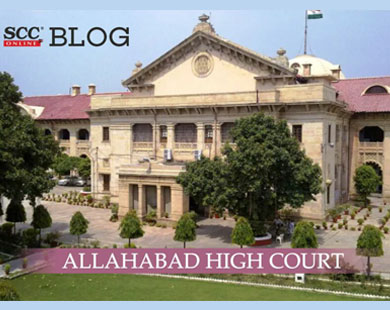Allahabad High Court: In an appeal against the order of Additional Sessions Judge convicting the appellant under Section 326-A of the Penal Code, 1860 (‘IPC') and sentencing him for life imprisonment and fine, the division bench of Pritinker Diwaker and Nalin Kumar Srivastava, JJ. set aside the impugned judgment and held that the convict is not guilty for the offence punishable under Section 326-A IPC.
In the case at hand, at night when the mother-in-law (victim 1) and the sister-in-law (victim 2) of the informant were sleeping some unknown person threw acid from the window and caused grievous hurt and deformity on their faces.
The Court said that there is no doubt as to the place and time of the occurrence, the manner alleged, the cause of injury, the medical evidence are the ingredients which stand in favour of the prosecution, but the most important aspect as to who was the assailant, is not proved beyond reasonable doubt based on the oral and documentary evidence on record. Even if it is assumed that the convict wanted to marry with the victim 2 and on earlier occasions, he had also threatened her, it is not a proof of that degree which can be taken as capable of proving the prosecution case beyond reasonable doubt but remains a mere suspicion in the light of the evidence on record.
Placing reliance on Sheila Sebastian v. R. Jawaharaj, (2018) 7 SCC 581 the Court reiterated that a legal position has been established that suspicion, howsoever strong, cannot take place of proof.
The Court took note of Anter Singh v. State of Rajasthan, (2004) 10 SCC 657, wherein the required conditions are propounded for the recovery evidence under Section 27 of the Evidence Act. The Court said that the so-called recovery of so many articles on the pointing out of the convict is not proved in the manner prescribed by the law.
The Court said that the prosecution has utterly failed to explain why the name of the convict was not disclosed by victim 2 to anyone after so many days of the occurrence. Further, if it accepted the statement of victim 1, that victim 2 had named the convict as assailant to her husband in the hospital, then why the husband was not produced in the court is also a point not explained by the prosecution. Hence, at this juncture, the evidence of victim 1 remains hearsay evidence only.
Further, the Court accepted the contention of the convict that if the convict accompanied the victim 2 throughout the period she remained in the hospital, then why has the investigating officer not arrested him. Thus, the Court said that if the facts and circumstances of the case and the evidence adduced are taken together, their cumulative effect creates a strong suspicion about the involvement and participation of the convict in the alleged crime and the judicial scrutiny and analysis of the matter takes us to the direction of benefit of doubt in favour of the convict.
Placing reliance on Mousam Singha Roy v. State of W.B., (2003) 12 SCC 377 wherein it was held that it is a settled principle of criminal jurisprudence that more serious the offence, the stricter the degree of proof, since a higher degree of assurance is required to convict the accused, and said that in our assessment, the prosecution evidence in this case does not meet out the required degree of proof.
The Court opined that the conclusion arrived at by the Trial Court in the impugned judgment is not in accordance with law and the evidence available on record. Thus, it held that the prosecution has not been able to establish the guilt of the convict under Section 326-A IPC beyond reasonable doubt and to the satisfaction of the judicial conscience of the Court.
Further, the Court relied on Suchand Pal v. Phani Pal, (2003) 11 SCC 527 , wherein it was held that, in case the evidence on record and in the facts and circumstances of the case shows that two views are possible, one pointing to the innocence of the accused and other to the guilt of the accused, the view which favours the accused should be preferred. The Court said that the Trial Court has erred in scrutinising and analysing the evidence on record and the finding in respect of the guilt of convict is perverse and not according to the law. Therefore, it granted benefit of doubt to the convict on the ground of rule of caution.
[Vimal Kumar Maurya v. State of U.P., 2023 SCC OnLine All 6, decided on 06-01-2023]
Advocates who appeared in this case :
Counsel for Appellant: – Advocate Rajiv Lochan Shukla, Advocate Chandra Bhan Dubey
Counsel for Respondent: – Advocate Ishwar Chandra Srivastava, Advocate Kamal Srivastava, Advocate Kaushlendra
*Apoorva Goel, Editorial Assistant has reported this brief.







